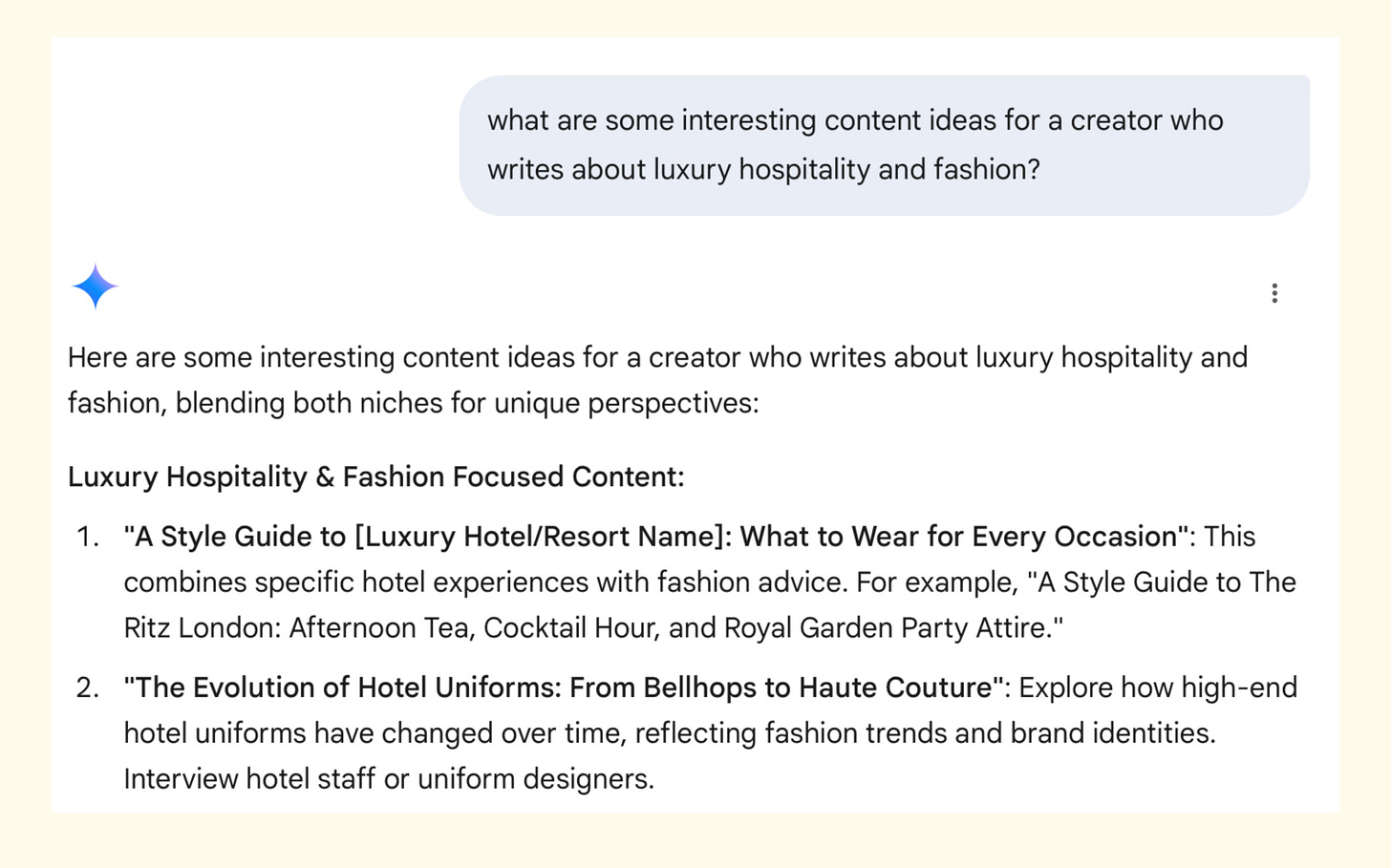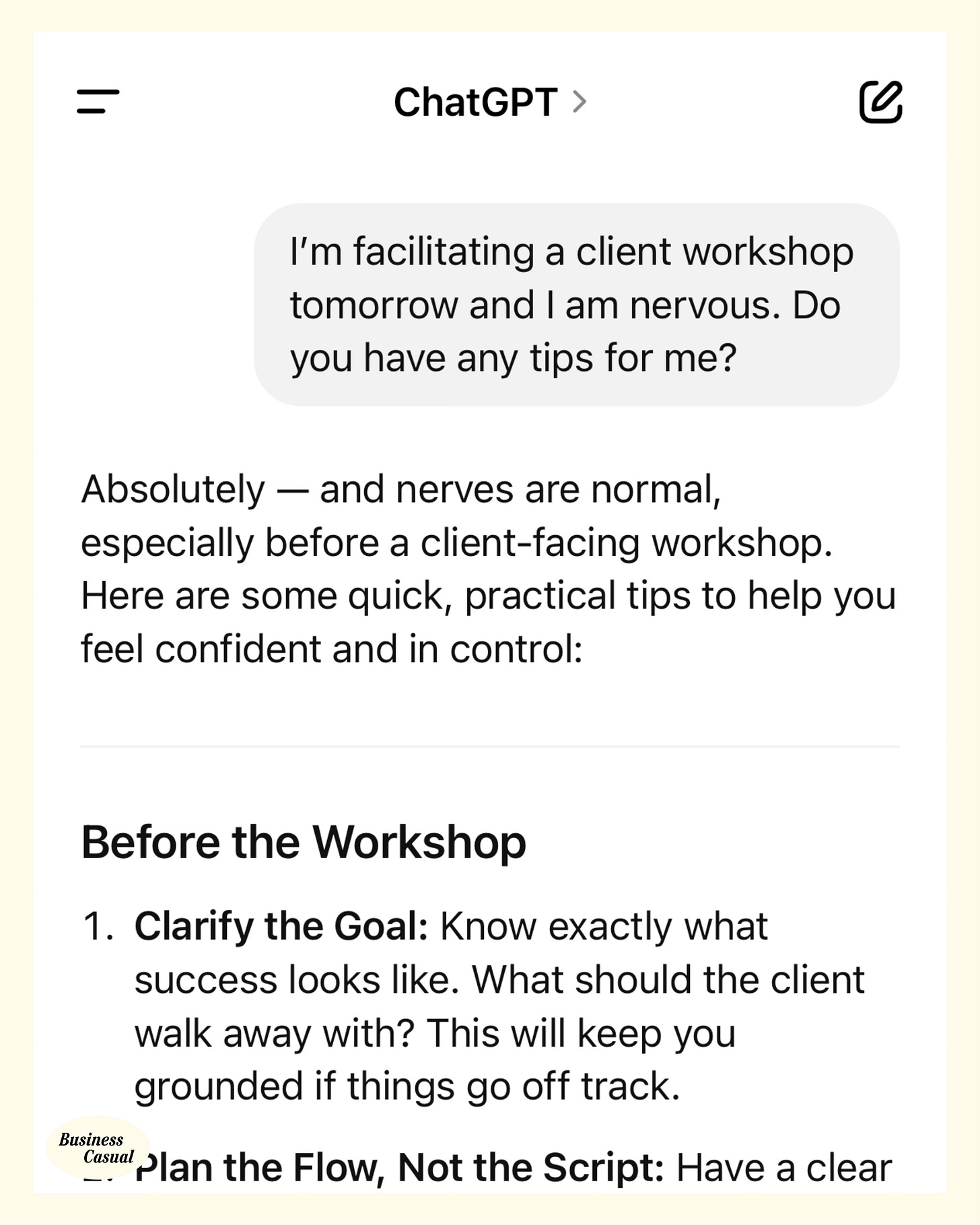How AI is making management consultants feel
Three consultants on navigating AI's impact on their industry
One of my former business professors at USC recently took a sabbatical to teach at UVA. When she returned, she told me about the differences she observed between students at both universities.
“At USC, 19 year olds wear suits and posture as McKinsey consultants. At UVA, they still have acne and actually check out books from the library.”
I can’t validate her impressions of UVA, but I can verify her portrayal of my alma mater. At USC, libraries were for case interview prep, not reading, and evenings were for networking with recruiters, not debating politics with peers. Landing a management consulting job was lucrative and coveted. It guaranteed good pay, prestige, and clear direction.
Now, I read constant — and often conflicting — headlines about how AI will affect the management consulting jobs that previously offered such a legible and desirable path. So I was curious to hear from three young people* working in the industry. How do they feel about AI? How are they using it? And most importantly, what are they doing to prepare for the future?
*All names have been changed at request.
PARTICIPANTS
Marissa, 28, Manager, Accenture
Jessica, 27, Consultant, Freelance
Edgar, 22, Incoming Business Analyst, FTI Delta
TRANSCRIPT
Fill in the blank: I’m feeling [blank] about AI these days.
Marissa: “Thankful”
Jessica: “Trepidatious”
Edgar: “Interested”
Marissa, why “thankful”?
In practice, using it, I see how helpful and amazing it is, and I feel like I’ve barely touched the full capabilities of it. It’s improved my day-to-day a ton, and I feel like I’m only on the tip of the iceberg.
Jessica, you said “trepidatious.”
I see its potential, but I’m uneasy about how quickly everything is moving without guardrails. And I’m worried about job displacement.
Edgar, tell me why you said “interested.”
I feel like we’re living through a very major shift in the technological revolution. Having been born in the early 2000s, a lot of the other technologies — like the Internet — came up before I was born, so I haven’t lived through a major shift in my lifetime. So I think it’s interesting to see where this will take us.
How often would you say you’re using it?
Marissa: Daily
Jessica: Daily
Edgar: Daily

Edgar, tell me how you’re using it.
Sam Altman said generations use AI very differently, like the younger generation uses it as their personal assistant and the older generation uses it as a Google replacement. I think having fun with AI as your personal assistant is very interesting, and that’s how I use it.
I haven’t started my job yet, but in my internship and at school I would use it as a starting point and then I would build off it. For example, if I was making presentations about anything I would give AI some context on what I’m doing and trying to achieve, then ask it to give me some structure and help me gather data. When I was done I would upload it and say “does this make sense and be brutally honest with me.” Because I found that when you just ask it a question, it validates what you’re already saying and feeling, so the way to combat that is to tell it to be very brutally honest. Like I literally tell it, “be brutally honest.” Then it gives me good feedback and I don’t have to ask someone else.
Marissa, how do you use it?
I use it to learn things very quickly since in consulting you have to catch up and learn things really quickly when you join a new project. So I just ask ChatGPT and I love that it returns its results in a second and it has everything you want there. And if you have more questions, you can just immediately follow up, like you’re having a conversation with an expert on the topic.
I barely use Google anymore. What’s the point of searching and having to look at all these various webpages to get bits and pieces of what you need when everything is just given to you through ChatGPT in a very clean and nice format?
Also sometimes I use it to give me a confidence boost — for it to tell me I’m going to do a good job and everything is going to be OK. Like this week I have to give big presentations and lead important workshops that I’m kind of stressed about. But the energy ChatGPT gives off is very positive, at least the version I use. I don’t know if people have different experiences but I feel like it can really make you feel empowered. It can pump you up or give you confidence or let you know everything’s going to be OK.

Edgar, I’m curious if you have any concerns, since you’re still very young, about developing a dependency on AI and losing some of your own critical thinking abilities.
Yes, I mean there is a risk of developing some over-reliance on it. But I think of the benefit of AI as a productivity enhancer, just like any other technology that we have. I like to look at history to see what happened in the past. Like in the 1970s and 1980s, before Excel was invented, all the investment bankers were just doing calculations by hand so there was less output per unit of input. But after Excel was introduced, investment bankers didn’t stop working. They just worked the same hours but they were generating more output per unit of input. I think AI is going to be very similar in that sense.
Marissa, since you work at Accenture, one of the biggest consulting firms, I’m wondering what your official company policy has been on AI.
Accenture has invested a lot in Generative AI and honestly a lot of the work with clients we do now is focused on bringing them AI solutions. So part of that effort is making sure employees are up to speed on AI capabilities and use cases. It’s highly encouraged to leverage it in our work.
Of course there are restrictions — like we could never put client information into an AI tool. But otherwise it’s really encouraged at the firm.
What do you think is going to happen to the consulting industry as a result of AI?
Jessica:
I think, in general, the consulting industry is going to shrink as a result of AI. A lot of entry level jobs for analysts are mainly working on creating decks. They’re going to be replaced because why pay a $90K starting salary when you can literally just have AI do it?
But at the same time, I think a lot of consulting projects are going to shift to where you’re going to have a lot of AI-focused projects. AI-implementation stuff. So just the nature of projects and work you get is going to shift.
Edgar:
I don’t see the hysteria and major concerns about it replacing consultants and this and that. I think that misses the whole point of the consulting industry. The point of consulting is to outsource work within organizations; they go through all the layers of corporate structure and gather data and analyze it to get a general understanding of where the company stands. This is going to remain relevant. At the end of the day, consulting very much deals with people.
What “human” skills do you think will become even more valuable in the AI-augmented consulting landscape?
Marissa:
A big part of consulting beyond pulling together a strategy or implementing a plan is stakeholder management — when you’re essentially building client relationships, managing expectations of different client leaders, and earning your clients’ trust. That’s a very human touch sort of area. I don’t know how AI would be able to facilitate or replace that. It’s a very delicate thing you have to learn over time.
Jessica:
I think originality. A lot of the consulting I do is with consumer brands and small businesses, and if they rely on AI, you’re going to risk having copy-paste language or imagery. So having original ideas is going to be even more important.
Edgar, you’re the youngest person I’ve spoken with. So I’m curious, what are you doing to stay ahead of this AI revolution?
I’m trying to learn about it as much as I can by understanding how I can best use it for my advantage and produce more output per unit of input. I also feel that with AI people will still need to trust other people, so if you work on your soft skills and people skills, that’s going to be an advantage moving forward, especially since a lot of these soft skills — like communication — are very lacking in my generation.
Marissa and Jessica, any other tips you have for aspiring consultants or other consultants on navigating AI?
Jessica:
I think just becoming really, really savvy at AI strategy and implementation projects. Most companies are behind and want to figure out how to use AI in their businesses so they’re going to look for consultants who are experts on AI implementation for those skills and knowledge. So getting really smart on AI can actually open up a lot of opportunity and potential work for you.
Let me know what industries you’d like me to explore next in the comments.




